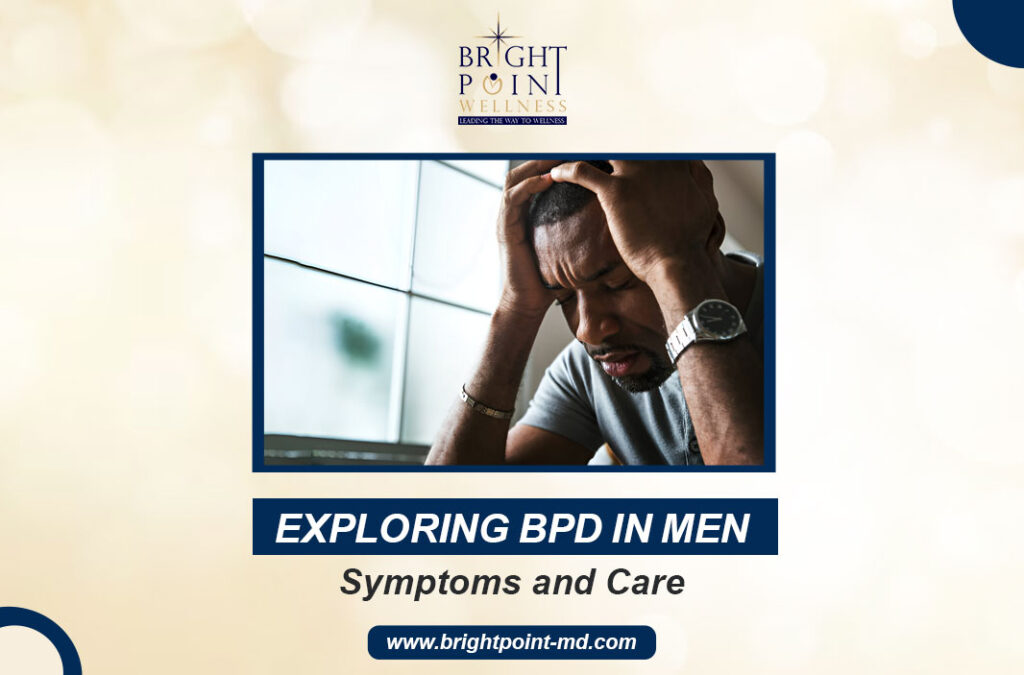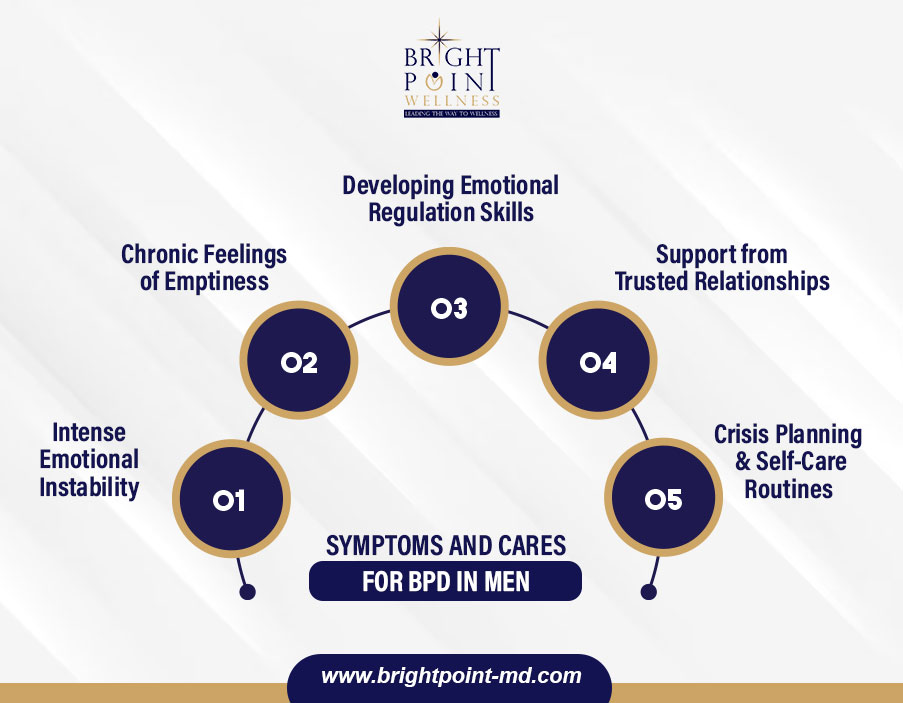
Borderline Personality Disorder in men is more common than people think. However, many men are unaware that they have it. Some signs of borderline personality disorder in men are anger, fear of being left, and rapid mood changes. These signs can resemble other problems, so they are often overlooked. Doctors say many men hide their feelings. That makes it harder to spot early signs.
Some men also think they must always be strong, so they do not ask for help. But that delay can hurt their mental health. Studies show that BPD in men is real and serious. The earlier it’s found, the better the care. Knowing the truth helps more men get support. That’s why awareness is key.
What Causes BPD in Men?
Borderline Personality Disorder in men can come from many causes. Some are born with it, while others develop it through life events. This is known as the nature vs. nurture debate. Nature encompasses aspects such as genetics and brain development. Nurture refers to the experiences that surround a person, such as trauma, loss, and family stress. Both can mix and lead to signs of borderline personality disorder in men.
In many cases, early childhood trauma plays a significant role. Brain function also plays a role, as it influences the regulation of emotions. Because of this, the causes of BPD are not always the same for every person. Understanding these causes helps doctors develop more effective treatments. That’s why a full mental health check is always a smart first step.
Symptoms of Borderline Personality Disorder in Men
Borderline personality disorder symptoms in men frequently appear differently than in women. Many men hide their emotions due to social pressure. As a result, their struggles go unseen. They may seem angry, distant, and overly confident. However, deep inside, they feel unstable and confused. This is called high-functioning borderline personality disorder.
These men may keep their jobs and relationships but still face intense emotional pain. Unlike women, men rarely openly show signs of fear or sadness. Instead, they may act out and withdraw into isolation. Understanding these hidden signs is key. With support, men can heal and build better emotional health over time.
BPD in Men vs Women
Borderline Personality Disorder shows up differently in men and women. Many men are often misdiagnosed and overlooked. This happens because their symptoms don’t always match the common signs seen in women. For example, men may exhibit anger or take risks instead of expressing sadness or fear.
Emotional expression in men tends to be less visible, which leads to confusion. That’s why understanding gender differences is essential for proper care. Without that, the right help can be delayed. Recognizing these changes enables doctors to provide more effective support.
BPD Men in Relationships and Emotional Connections
Men with Borderline Personality Disorder often face struggles in close relationships. They may fear rejection or feel easily hurt. As a result, they can become angry, distant, and overly attached. This push-and-pull behavior confuses partners and creates emotional stress. In a BPD relationship, trust can break down quickly. Minorll issues may feel like significant threats. Men might say hurtful things, but regret them later.

These patterns affect both romantic and family bonds. Understanding how BPD men in relationships act is key to offering better support. With care, therapy, a nd patience, these emotional ups and downs can be managed. Healing begins when both sides feel safe, heard, and ready to grow together.
Managing BPD in Men: Best Treatment Paths
Men with Borderline Personality Disorder need clear, caring support. Often, therapy is the first step. Cognitive Behavioral Therapy (CBT) helps men understand and change harmful thoughts. Medication may also ease mood swings or depression. Support systems, such as family, group therapy, and community programs, can make the healing process feel less lonely.
Over time, many men do recover. For example, some share stories of slow progress but significant change. Each man’s path is different, but help works. These treatment options for men with BPD are not just hopeful, they are proven. With the right tools, healing starts. And yes, recovery is always possible.
Why Bright Point MD is a Trusted Choice for BPD Treatment
Bright Point MD is a trusted choice for men seeking help with Borderline Personality Disorder. They offer expert care and compassionate support tailored to each individual’s needs. Their thorough assessment process helps men understand their symptoms and begin effective treatment quickly. Through this process, men receive a personalized recovery plan tailored to their unique situation.
Our team guides patients every step of the way, making the journey easier and hopeful. For those ready to take control, we provide a free BPD assessment. Book a consultation with Bright Point today to create your personalized stress-relief plan and start healing.
Conclusion
Living with Borderline Personality Disorder in men can feel isolating, but you are not alone. Many others face the same struggle and have found help. With the proper care, recovery is possible. Support options, such as therapy, support groups, and mental health services, are available and effective. At Bright Point, expert help is just a step away.
Most importantly, having BPD does not define who you are. Breaking the stigma starts with understanding and compassion. With encouragement, treatment, and support, a healthier and more balanced life is within reach. You deserve to feel better. Your journey starts now.
FAQS
Q. In what ways does Borderline Personality Disorder show up differently in men than in women?
Men with BPD frequently show off extended aggression, impulsivity, and substance abuse, while women may also show more temper swings and self-harming behaviors.
Q. What are the usual signs of Borderline Personality Disorder in men?
Commonplace symptoms include intense anger, unstable relationships, and impulsive behaviors. Men may also experience fear of abandonment and ongoing feelings of emptiness.
Q. Why is Borderline Personality Disorder frequently underdiagnosed in men?
Societal expectations may lead men to mask their emotional struggles, and their signs can resemble different disorders, complicating accurate prognosis.
Q. What remedy alternatives are available for men with Borderline personality disorder?
Effective remedies include psychotherapy, such as Dialectical Behavior Therapy (DBT), and medications to manage specific symptoms.
Q. How can cherished ones assist a person diagnosed with Borderline personality disorder?
Providing understanding and encouraging therapy are key ways to offer support. Setting healthy boundaries and learning about BPD can also help care for a loved one.








